Youngsters eager to take control of their fitness often ask, What are net calories? With the current prevalence of fast food, sugary drinks, and processed snacks, a significant portion of daily calories is now derived from junk food. Eventually, these high-calorie yet low-nutrient options make it challenging to maintain a balanced diet.
At this moment, a detailed understanding of net calories becomes a turning point in any fitness journey. For concerned individuals, the guide below provides a more effective way to interpret their body's energy report, enabling them to lead a more balanced lifestyle.
In this article
Part 1. What Are Net Calories and How Do They Work?
Net calories represent the balance between the number of calories you consume and the total calories your body burns. They help you determine whether you're in an energy surplus, an energy deficit, or maintaining your current weight. Knowledge of questions like what my net calories should be helps you gain a picture of your calorie balance for informed nutritional intake.
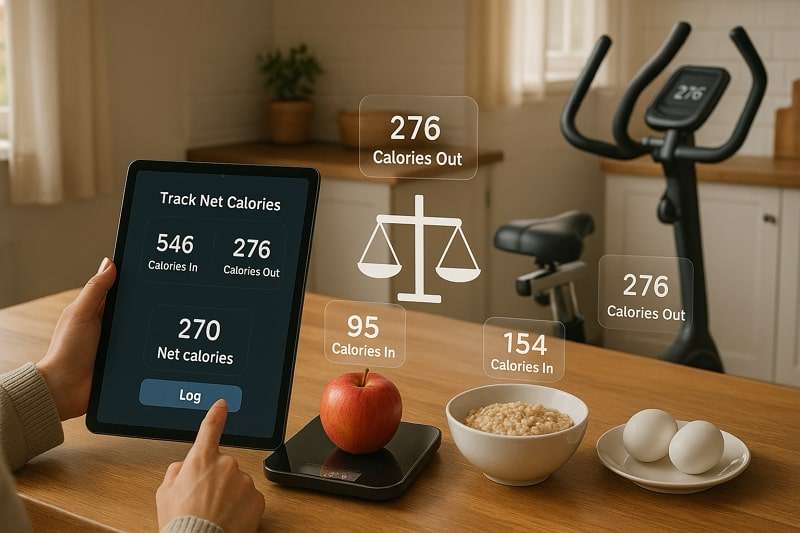
How Net Calories Work [For Beginners]
1. Basic Formula Understanding
Net Calories = Calories Consumed – Calories Burned
Here, "Calories Consumed" means all the energy you get from food and drinks. Whereas "Calories Burned" involves not just exercise but also calories used for basic functions and digestion.
2. Food Energy and Digestion
Every food you eat contains potential energy, measured in calories, which is essential for understanding. Before your body can use this energy, food must be digested, a process known as the Thermic Effect of Food (TEF). Protein-rich foods have a higher TEF, while carbs and fats are lower, so not all consumed calories end up as net energy.
3. Activity and Calorie Burn
Calories burned include everything from walking and exercising to even fidgeting, as well as the energy used for breathing. The more active your lifestyle, the higher your total calorie burn, and the lower your net calorie intake from the food you consume.
4. Role of Tracking
A consistent track for both intake and expenditure helps you avoid accidental under- and over-eating. Several calorie-tracking apps make it easier to monitor net calories and align your diet with your personal health goals.
Example - Daily Routine Comparison
- Person A: consumes 2,000 calories and burns 500 calories in exercise, resulting in net calories of 1,500 (2,000 - 500 = 1,500).
- Person B: Intakes the same 2,000 calories but only burns 100 calories from daily movement, so net calories are 1,900 (2,000 - 100 = 1,900).
Eventually, person A is more likely to lose weight or maintain a lower body weight. On the other hand, person B could gain weight if intake is adjusted.
Part 2. What Should Net Calories Be to Lose Weight
When it comes to shedding extra pounds, many people wonder, What should my net calories be to lose weight? For a safe and effective weight-loss journey, walk through the section and have a clear understanding of the term:
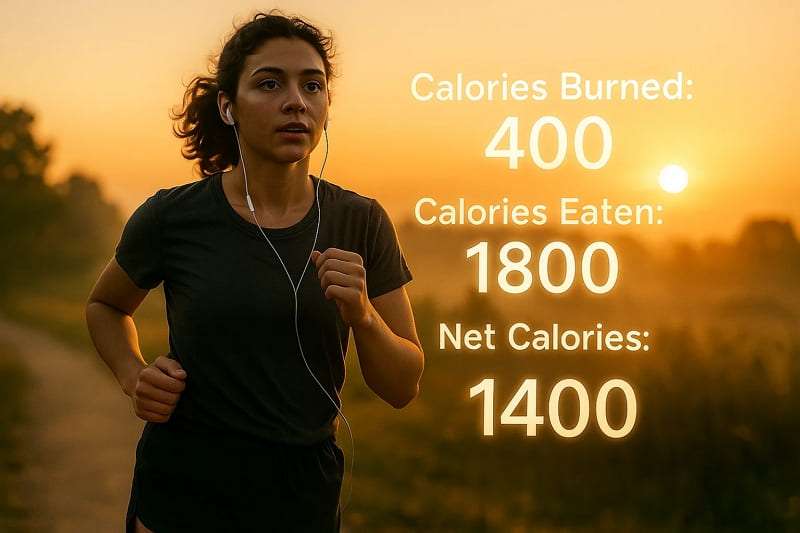
- Safe Calorie Deficit Range: Experts recommended a daily net calorie deficit of 300–500 calories to achieve sustainable weight loss of about 0.5-1 pound per week. This moderate deficit is enough to facilitate fat loss, minimising the risk of muscle loss or nutrient deficiencies.
- Risks of Overly Low-Calorie Intake: Calorie restriction (below 1,200 calories/day for women and 1,500 calories/day for men) can trigger metabolic adaptation. Studies reveal that low protein intake or lack of resistance training further increases the chances of muscle breakdown.
- Importance of Gradual Fat Loss: Gradual weight loss allows the body time to adjust, helps maintain lean muscle, and enables continued intake of nutrient-dense foods. Conversely, rapid weight loss often results in the loss of more water and muscle rather than fat.
- Professional Recommendations for Long-Term Success: Authorities, such as the Mayo Clinic and Harvard Health, emphasize lifestyle-based weight loss. Most experts recommend a target of 1-2 pounds per week through adjustments to diet and activity, combined with regular monitoring and flexibility.
Part 3. What Should My Net Calories Be for My Body Type
For a workaround, what should my net calorie intake be? It's important to remember that everyone's body works differently. To have better guidance, the following section highlights essential factors that affect net calories, along with a progress tracker:
Factors That Affect Your Ideal Net Calories (Age, Gender, Activity, Type, Goals)
Everyone's calorie requirement is unique and is affected by the listed factors or daily lifestyle choices:
1. Age
As you age, your metabolism naturally slows, and your body's calorie needs generally decrease. Children and teens require more calories per pound for growth compared to adults over 50. Older individuals typically require fewer calories to maintain their weight due to a slower metabolism and a decrease in muscle mass. For instance, a 25-year-old will generally need more calories than a 65-year-old of similar size and activity level.
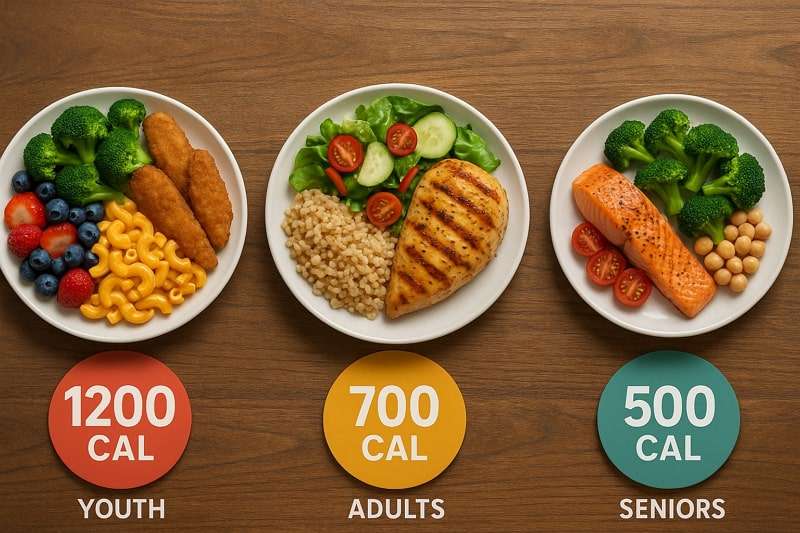
2. Gender
Males usually have more muscle mass and a higher basal metabolic rate than females, thus requiring more calories. Hormonal differences further amplify this effect because Testosterone in men promotes muscle growth and increased metabolic rate.
Whereas estrogen in women is associated with greater fat storage, particularly in preparation for pregnancy and lactation. Globally, men are more likely to engage in higher-intensity physical activity, whereas women may experience a decline in physical activity due to hormonal fluctuations.

3. Activity Level
Activity level is a crucial driver because it directly increases the amount of energy (in the form of calories) the body burns each day. It isn't limited to formal workouts; it includes everything from planned exercise, such as running, to everyday movement. Even moving from a sedentary to a moderately active lifestyle can substantially boost calorie needs and help maintain a healthy weight.
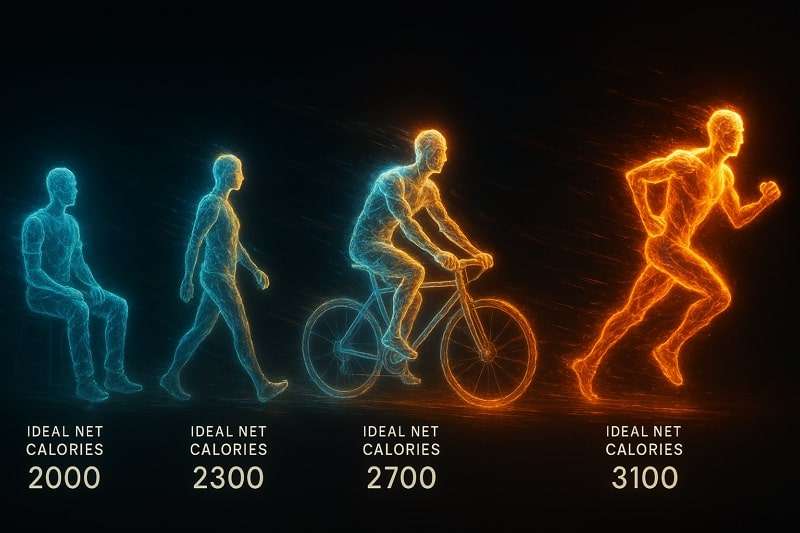
4. Body Type and Composition
Body composition refers to the proportion of lean tissue (muscles or organs) versus fat in your body. People with more lean muscle mass have a higher resting metabolic rate and consequently burn more calories, even at rest. This is why athletes generally need more calories than people of the same weight but with a higher fat percentage. Overall, the higher your muscle-to-fat ratio, the higher your daily calorie requirement will be.
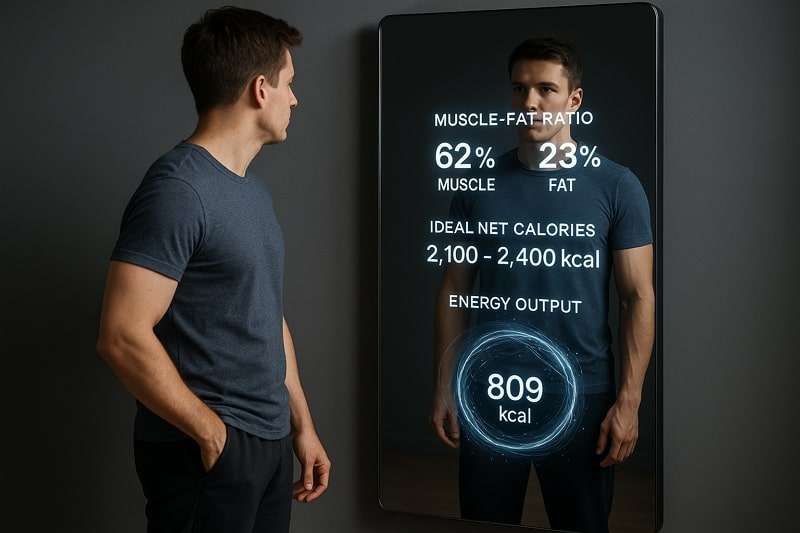
5. Health Goal
It is essential to consider that your calorie target should align with your personal health goal. For weight loss, you should eat slightly fewer calories than you burn to create a consistent deficit. To maintain weight, try to match your energy intake with your expenditure. For muscle gain or maintaining a healthy weight, maintain a slight calorie surplus and fuel your body with sufficient protein and nutrients.
| Age | Gender | Activity Level | Health Goal | Typical Net Calories/Day | Key Notes |
| 25 | Male | Active | Maintenance | 2,800 | Regular sports, including gym |
| 40 | Female | Sedentary | Weight-loss | 1,200 | Light activity, calorie deficit |
| 35 | Male | Moderately Active | Weight loss | 2,000 | Office worker, light exercise |
| 55 | Female | Active | Maintenance | 2,000 | Regular walks, swimming |
| 20 | Male | Sedentary | Maintenance | 2,400 | Minimal exercise |
| 30 | Female | Moderately Active | Muscle gain | 2,200 | Lean build, strength training |
Track Your Progress Smartly- Calorie Tracking App
Once you know what are net calories, AI Calorie Counter - CalBye becomes your ultimate companion for calorie tracking. It isn't another fitness app; it's your personal guide to staying consistent, accountable, and informed about your nutrition. The AI food recognition technology allows users to scan their food images for instant nutrient insights. More impressively, you can log your meals to avoid repetitive scanning for your favorite dishes.
Based on your preferences, the app further provides personalized suggestions or healthier fat swabs. It functions as a precision macro tracker that automatically adjusts your daily targets based on your progress. Overall, this approach to more personalized nutrition makes healthy eating feel intuitive and achievable. Most importantly, without judgment, the app continually encourages and boosts your confidence throughout the journey.
Key Features
- Daily Meal Planner: It supports fitness freaks with three optional, AI-powered, innovative options for balanced, goal-aligned suggestions.
- Food Barcode Scanner: The app uses AI food recognition technology to scan the barcode and provide detailed nutritional insights.
- Supports Text Description for Calorie Insights: You can even describe your meal in detailed text to reveal complete nutritional insights on the screen.

Step-by-Step Tutorial to Track Calories Through CalBye
Adhere to the guidelines and have command over your diet with a brief understanding of what your net calories should be:
Instructions. Install the app, then select the "Scan Meal" option from the main interface. Here, choose the "Nutrition" option and press the "Capture" button to take the image. Once done, the app will reveal all the nutritional insights of your meal.
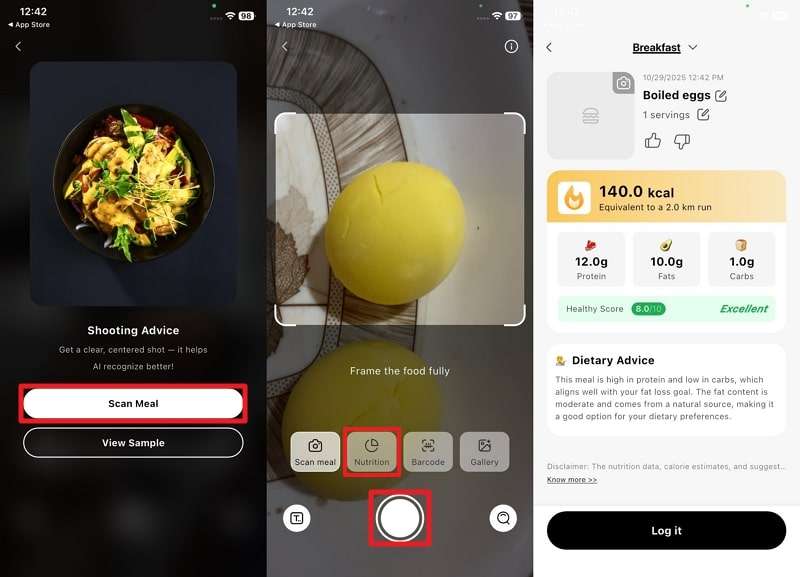
Part 4. What Net Calories to Lose Weight: Sample Daily Plan
To simplify things for what net calories to lose weight, follow these meal plans as guided below for sustainable weight loss:
Plan 1. 1,200-Calorie Deficit Meal Plan
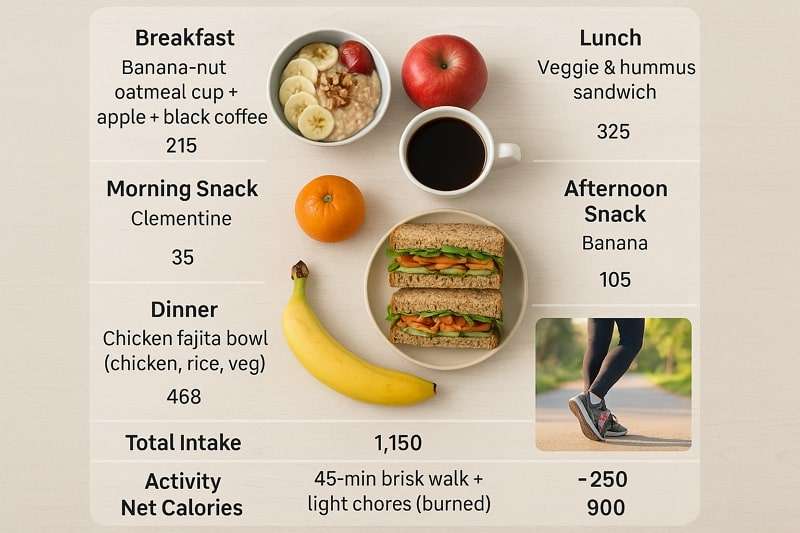
| Meal | Food/Activity | Calories |
| Breakfast | Banana-nut oatmeal cup + apple + black coffee | 215 |
| Morning Snack | Clementine | 35 |
| Lunch | Veggie & hummus sandwich | 325 |
| Afternoon Snack | Bananas or any other fruit | 105 |
| Dinner | Chicken fajita bowl (chicken, rice, vegetables) | 468 |
| Total Calorie Intake | 1,150 | |
| Activity | 45-min brisk walk + light chores (burned) | 250 |
| Net Calories | 900 | |
Plan 2. 1,500-Calorie Balanced Weight Loss
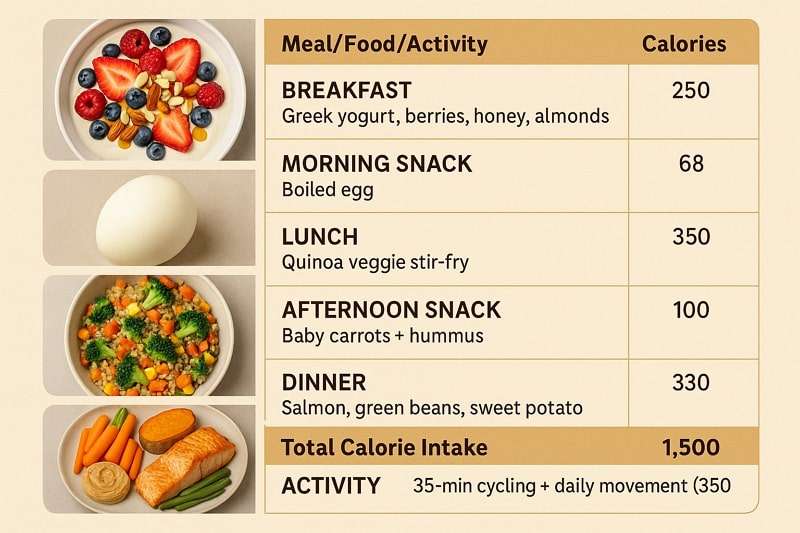
| Meal | Food/Activity | Calories |
| Breakfast | Greek yogurt, berries, honey, almonds | 250 |
| Morning Snack | Boiled egg | 68 |
| Lunch | Quinoa veggie stir-fry | 350 |
| Afternoon Snack | Baby carrots + hummus | 100 |
| Dinner | Salmon, green beans, sweet potato | 330 |
| Total Calorie Intake | 1,500 | |
| Activity | 35-min cycling + daily movement (burned) | 350 |
| Net Calories | 1,150 | |
Part 5. What Should My Net Calorie Intake Be for Maintenance vs Deficit
For a fitness plan, it's essential to understand what my net calories should be to align with my body's energy needs. To know the right balance, review the table below and maintain your current weight or work toward a healthy calorie deficit:
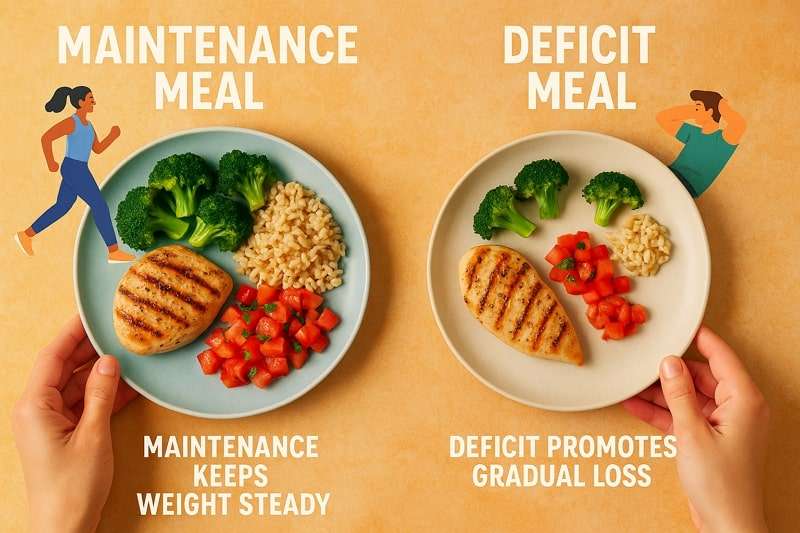
| Goal Type | Description | Calorie Adjustment | Expected Result | Recommended Approach |
| Maintenance | Keeps your current weight stable by balancing the calories you consume with the calories you burn. | Net calories equal total daily energy expenditure (TDEE). | Weight remains steady while maintaining energy and metabolism. | Track intake using tools like CalBye and adjust slightly based on activity changes. |
| Mild Deficit | Promotes gradual, healthy fat loss without energy depletion. | Reduce daily intake by 300-500 calories below TDEE. | Lose about 0.5-1 kg (1-2 lbs) per week sustainably. | Focus on consuming nutrient-rich meals and engaging in regular physical activity to maintain muscle strength. |
| Aggressive Deficit | Accelerates weight loss but may slow metabolism and cause fatigue. | Reduce daily intake by 600-800 calories below TDEE. | Rapid initial weight loss, but it may not be sustainable long term. | Use only short-term under the supervision of a nutrition professional. |
| Surplus (for reference) | Supports muscle gain and recovery for active individuals. | Increase daily intake by 200–400 calories above TDEE. | Gradual muscle gain and improved strength. | Combine with strength training and a balanced diet that includes adequate protein intake. |
Conclusion
In summary, the concept of net calories represents a significant shift in how you understand your body's energy balance. Instead of simply counting numbers, you begin to see how every meal fuels your goals and how activity impacts your progress, which feels sustainable. To make this venture easier, download the AI Calorie Counter - CalBye app and track every intake in real-time.

FAQs
-
What happens if my net calories are too low?
When you consume too few net calories, it can slow your metabolism, cause fatigue, and lead to nutrient deficiencies. It's best to aim for a moderate calorie deficit of around 300-500 calories per day for healthy, sustainable weight loss. -
Can I still lose weight if I eat more but burn more calories?
If your calorie burn from exercise and other activities exceeds your calorie intake, your net calories will create a deficit, leading to weight loss. This means you can enjoy a satisfying diet as long as you maintain an active lifestyle that balances your energy output with your goals. -
What's the difference between total calories and net calories?
Total calories refer to all the calories you consume, while net calories account for what's left after subtracting the energy you burn. A brief understanding of my net calories provides a more accurate reflection of my body's actual energy usage.






